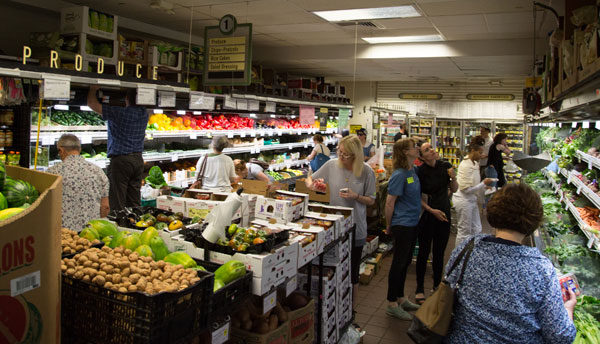Short Summary
The Park Slope Food Coop is not just a standard coop, but a "member labor coop" (source). It has provided "good food at low prices for its more than 17,000 working members through cooperation since 1973," and is a $50+ million-a-year business.
Logo.
source ![]()

A view of the Coop from outside.
source ![]()
Profile
The PSFC was founded in 1973 after a group of people mostly in their 20s decided that they wanted greater access to fresh, affordable groceries. They were part of a larger movement of 1970s food coops. However, their motivation was different, according to co-founder Joe Holtz:
"The Park Slope Coop’s big innovation was thorough management, with a clear goal. Many co-ops formed as an expression of political activism, but Holtz says he and his partners organized with different ideals: 'We wanted to build cooperation, have a community success in a country that puts too much emphasis on individual success. But it wasn’t a do-gooder project; we were self-helpers.'" (source)
The Park Slope Food Coop is successful in large part because it consistently decommodifies work. The model of full member participation in labor is rarely implemented, but is key for "scaling.”
From the PSFC Mission Statement:
"The Park Slope Food Coop is a member-owned and operated food store–an alternative to commercial profit-oriented business. As members, we contribute our labor: working together builds trust through cooperation and teamwork and enables us to keep prices as low as possible within the context of our values and principles. Only members may shop, and we share responsibilities and benefits equally. We strive to be a responsible and ethical employer and neighbor."

A photo of the produce aisle at the Coop.
source ![]()
PSFC’s seven cooperative principles:
- Voluntary and Open Membership — open to all persons able to use their services and willing to accept the responsibility of membership, without any form of discrimination.
- Democratic Member Control — active member participation in setting policies and making decisions. Elected representatives are accountable to the membership; voting is based on the principle of one member, one vote.
- Member Economic Participation — equitable contribution to and democratic control of the coop’s capital.
- Autonomy and Independence — if a coop enters into agreements with other organizations, including governments, or raises capital from external sources, they do so on terms that ensure democratic control by their members and maintain their cooperative autonomy.
- Education, Training and Information for members and partly the general public.
- Cooperation Among Cooperatives via local, regional, national and international structures.
- Concern for the Community — While focusing on member needs, cooperatives contribute to the sustainable development of their communities.
YOUTUBE 3rayQP2W3wg Video about the Park Slope Food Coop by GRITtv
Governance
Only members may shop at the Coop, but membership is open to all. Members don't have to live in Park Slope.
The coop has a system of member ownership in which membership and ownership are inextricable. Whoever joins the Coop becomes a member-owner. This has real consequences, as the membership manual explains:
"Membership is defined by your participation in the workslot system, while ownership is defined by your financial contribution. This contribution is officially called a member-equity investment. The term “member-owner” is legally defined in the coop's bylaws as “a holder of a membership in a cooperative” where “the terms‘ member’ and ‘owner’ and ‘member/owner’... all mean the same thing.”The membership manual continues:
"You may feel your ownership more strongly at times, and your membership at others. However, the Coop functions best when we all hold both roles in mind at once: Approach your membership (and workslot) like an owner, and approach your ownership with an eye to creating the best experience and the greatest benefit for all the Coop." (MM, p.1)
Projects
Their Revolving Loan Fund Committee supports new member labor food coops through the Fund for New Food Coops since 2012, when the General Membership voted to create and donate $20,000 per year to the fund.Friends & Partners
- See PSFC's Community Ties, "a directory of businesses offering discounts exclusively for [PSFC] members"
Finances
In order to join the Park Slope Food Coop, members are required to pay a fee of $25 (not refunded) as well as investing $100 into the Coop (which can be refunded if they end their Coop membership). Low-income members who receive assistance pay a lower $5 fee and are only required to invest $10.Because members work at the Coop, the Coop doesn't have to pay anyone for their labor, which means they are able to sells their products at a significantly lower markup—a 21% markup from wholesale prices, versus 26–100% at supermarkets.
See Also
- Tante LeMi
- La Louve, a similar coop inspired by/modeled off of PSFC located in Paris, France
- Wikipedia article, "List of food cooperatives"